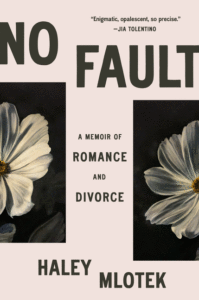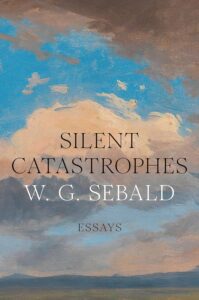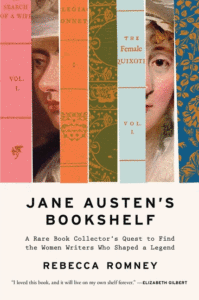5 Book Reviews You Need to Read This Week

Our basket of brilliant reviews this week includes Ron Charles on Eric Puchner’s Dream State, Becca Rothfeld on Haley Mlotek’s No Fault, John Banville on W. G. Sebald’s Silent Catastrophes, Sadie Stein on Rebecca Romney’s Jane Austen’s Bookshelf, and Rachel Monroe on Carmen Boullosa’s Texas: The Great Theft.
Brought to you by Book Marks, Lit Hub’s home for book reviews.
*
“Although Puchner’s novel is a long, deep ride that traverses half a century, it never labors under the weight of its broad scope. Instead, with every chapter, the story feels animated only by the spontaneous possibilities of moments in which loyalty is respected or ignored, passion resisted or sated. That vast procession of Schrödinger’s cats, stretched out over the decades, gradually coalesces into a family history that feels monumental.
…
“The book’s effect is hypnotically telescopic, a vision of people we come to know across decades. Puchner’s manipulation of time is among his novel’s most magical elements. Typically, the years pass between chapters, but the children ‘moved through Summer Time, in which days were really years.’ The pages begin to feel like days of a calendar flipping by in the wind.
In one sense, it’s a vertiginous, godlike perspective that allows us to see the erratic way that hopes and dreams germinate or wither on the rough ground of fate; disappointments accrue even as love and friendship persist. Puchner’s narration, which can slip from funny to harrowing as fast as a young man can ski to his death, cradles each of these characters through the vagaries of life.
…
“This isn’t a work of science fiction, and Puchner has little interest in predicting the technological wonders or political horrors ahead, but he pays close attention to the health of the environment. It’s an affecting reminder that all our choices over the next couple of decades—our marriages, births, affairs, reunions and deaths—will play out in a climate growing increasingly inhospitable.”
–Ron Charles on Eric Puchner’s Dream State (The Washington Post)

“It is a truth universally acknowledged, that a newly divorced woman in possession of literary talents must be in want of a book contract. The past year has yielded a barrage of autobiographical meditations on divorce…[Mlotek] is the only one in her cohort to explicitly conceive of her story as an homage to an older form, the marriage plot, though she is not alone in seeking to subvert the tropes of the traditional narrative. No Fault is a nonlinear rebuke to the tidy ordering of the classics, which start with a meet-cute and conclude with a wedding.
…
“Mlotek, in contrast, begins with her divorce, loops back to her childhood, leaps forward to the ambivalently hollow months following the collapse of her marriage, then retreats once more to the acidic bickering that ate away at her relationship. No Fault is a ferment of ideas and references—it contains sharp forays into the history of divorce and shrewd readings of books like Phyllis Rose’s Parallel Lives: Five Victorian Marriages—but its true innovation is formal. The divorce it memorializes is both personal and narrative: Mlotek leaves the comforts of her marriage in search of chaos, and her story strays from the neat staple of sequence in search of stranger surprises.
…
“No Fault is not even a narrative so much as an investigation, an invocation, a mood.”
–Becca Rothfeld on Haley Mlotek’s No Fault: A Memoir of Romance and Divorce (The Washington Post)

“Those of us who admire Sebald the novelist—a warm commendation of his work, from the present reviewer, is printed on the jacket of Silent Catastrophes—will seize on this collection with the keenest anticipation. Alas, we will be sorely disappointed. The essays, with some exceptions, represent academic writing at its most convoluted, most resistant and most sterile, the deathless products of the publish-or-perish academic treadmill.
…
“The words heimat and unheimlich recur throughout these pages in sombre antiphony. Heimat is a state of being, a state of belonging, the resonance and weight of which the English word ‘home’ does not adequately convey. Meanwhile, Das Unheimliche is the title of Freud’s famous essay On the Uncanny. To be without a home, then, is to be without a place where the soul may rest easy, or if not easy, then in a condition of heitere melancholie (cheerful melancholy), which is how the German publisher of these essays characterized the Sebald tone.
…
“It affords a reviewer no pleasure to be harsh on this book, which Jo Catling frankly declares was ‘a labour of love.’ However, to present in the guise of a volume of mainstream essays the spade-work left over from a life of academic toil can only diminish the posthumous reputation of a writer who, in books such as The Rings of Saturn and the superb Austerlitz, showed himself to be one of the last masters from the great age of Mitteleuropean high literature that is now drawing to a close, in its own silent catastrophe.”
–John Banville on W. G. Sebald’s Silent Catastrophes: Essays (The Guardian)
“It is a truth universally acknowledged (at least in publishing) that books about books sell well, and, judging by their profusion, that includes those devoted to Jane Austen Inc. Jane Austen’s Bookshelf, by Rebecca Romney, would seem optimized for readers who like to absorb their masterpieces by osmosis. Yet it springs from a place more personal and idiosyncratic than the cozy title might suggest. Put it another way: I certainly didn’t expect to make so many furious notes in the margins.
…
“Romney is no ordinary reader: She approaches her ‘investigation’ with discipline and zeal. (‘No, I won’t stop quoting Holmes,’ she writes menacingly—and accurately—of Sherlock.) Also, she wants to read the books in contemporary editions.
…
“I was less interested in seeing her hot on the case of the Missing Canon or tracking down a first edition of Charlotte Smith’s ‘Elegiac Sonnets’ than I was in watching this one reader learning, and thinking, in real time—as her sometimes reflexive presentism and flippancy (‘#notallmen’) give way to a sympathy that extends across centuries. Her narrative bravado evolves to something truer and more genuinely seeking as her confidence in her own reactions increases.
Throughout, Romney gives the reader glimpses into her own story: She describes a conservative Mormon childhood in which she fought against the gender and intellectual strictures even as she learned to value community. For her, these struggles over morality and conduct are not historical abstractions, but a part of her lived experience—and her present. Her passages on overcoming internalized misogyny to appreciate romance novels (via Burney’s Evelina) are a small gem of passionate criticism.”
–Sadie Stein on Rebecca Romney’s Jane Austen’s Bookshelf (The New York Times Book Review)

“This world of advantage-seeking and gleeful exploitation is the backdrop for Carmen Boullosa’s rollicking, righteous epic Texas: The Great Theft, which takes place over a few months in 1858. Boullosa’s novel…is a cacophonous book that sometimes feels as though it is trying to contain the whole world: a list of characters at the back of the book runs to more than two hundred entries, not all of them human. The Texas-Mexico borderlands of Boullosa’s book, while not exactly cosmopolitan, are a bustling place of cultural and economic exchange.
…
“…a recap of the historical context hardly captures what it feels like to read this book. Readers will encounter sneak-attacks and shootings and a pivotal lynching. But, amid the action set pieces, Boullosa’s narrator—a chatty, omniscient, hovering presence—keeps getting distracted. The experience of reading Texas: The Great Theft is one of a largely pleasurable bombardment of names, backstory, entanglements. Characters parade across the page, engaged in their own private (or public) dramas. Some of these figures will prove instrumental; some will reappear only briefly, or not at all. The narrative voice floats over the border towns, as if reporting on footage shot by a drone; then it follows the path of a bullet as it tunnels into a brain, recording a character’s final, fleeting thoughts.
…
“Texas: The Great Theft covers the period when a fluid, hybrid world begins to take the shape of the ‘Texas Story’ as told by the 1836 Project. The crimes it took to get there have been papered over by a heavily mythologized history. Greed and exploitation are reframed as ‘fortitude and nerve,’ and the result—Texas as it is today—is presented as if it is not only natural and inevitable, but also righteous. Texas: A Great Theft isn’t so much a rewriting of the Texas story, though, as a gossipy undermining of it, one that exposes the whole grand myth as silly and self-serving, nowhere near what was really going on.”
–Rachel Monroe on Carmen Boullosa’s Texas: The Great Theft (Bookforum)


